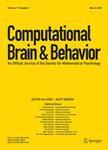版权所有:内蒙古大学图书馆 技术提供:维普资讯• 智图
内蒙古自治区呼和浩特市赛罕区大学西街235号 邮编: 010021

作者机构:Department of Psychology University of Washington Seattle 98195 WA United States Bernoulli Institute for Mathematics Computer Science and Artificial Intelligence University of Groningen Groningen Netherlands
出 版 物:《Computational Brain and Behavior》 (Comput. Brain. Behav.)
年 卷 期:2024年第7卷第3期
页 面:420-436页
基 金:National Institutes of Health, NIH McDonnell Center for Systems Neuroscience
主 题:Computational models Decision-making Declarative memory Episodic memory fMRI Functional connectivity Human connectome project Individual differences Procedural memory Reinforcement learning
摘 要:Experiential decision-making can be explained as a result of either memory-based or reinforcement-based processes. Here, for the first time, we show that individual preferences between a memory-based and a reinforcement-based strategy, even when the two are functionally equivalent in terms of expected payoff, are adaptively shaped by individual differences in resting-state brain connectivity between the corresponding brain regions. Using computational cognitive models to identify which mechanism was most likely used by each participant, we found that individuals with comparatively stronger connectivity between memory regions prefer a memory-based strategy, while individuals with comparatively stronger connectivity between sensorimotor and habit-formation regions preferentially rely on a reinforcement-based strategy. These results suggest that human decision-making is adaptive and sensitive to the neural costs associated with different strategies. © Society for Mathematical Psychology 2024.